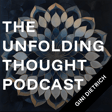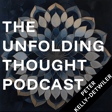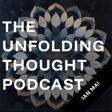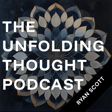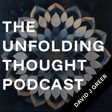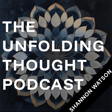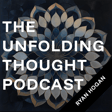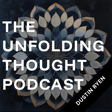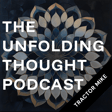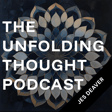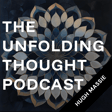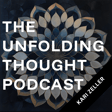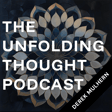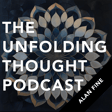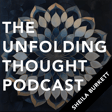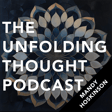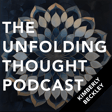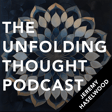Introduction to the Podcast
00:00:03
Speaker
Hi, I'm Eric Pradham. Welcome to the Unfolding Thought Podcast, the show for leaders and deep thinkers who demand more than the usual fluff. If you're the kind of person who moves on from a book, video, or podcast, the moment it stops making you think or introducing you to something you can use, I hope you'll feel right at home here.
00:00:25
Speaker
In each episode, we uncover the deeper, often overlooked forces that shape our thoughts and behaviors so you can see yourself, your team, and the world from a whole new angle and then actually apply what you learn to grow and do better.
00:00:42
Speaker
On the Unfolding Thought Podcast, we aim for minimal filler and maximum insight, challenging assumptions and sparking new thinking every step of the way. Are you ready to dive deeper?
00:00:55
Speaker
Then let's get started.
Interview with Ted Wright on Word-of-Mouth Marketing
00:00:57
Speaker
Today, I'm speaking with Ted Wright, CEO of Fizz and a 25-year veteran of word-of-mouth marketing. Ted's been behind the rise of iconic brands like PBR, the comeback of Chocolate Milk, and even Intel's breakthrough.
00:01:12
Speaker
In our conversation, you'll hear why Ted believes all great sales begin with a conversation between two people who trust each other. He'll also share how he built Fizz on the same principle that you can't broadcast your way to success these days.
00:01:28
Speaker
You have to have authentic, interesting, and relevant stories. If you're looking to elevate your marketing, connect more genuinely with customers, or just want a fresh perspective on how real buzz is built, this episode is for you.
00:01:43
Speaker
And now I bring you Ted Wright.
00:01:48
Speaker
Ted, thank you for joining me. Would you mind telling me a little bit about yourself?
Ted Wright's Journey and Philosophy
00:01:53
Speaker
Thanks for having me, Eric. So Ted Wright, um University of Chicago MBA. I've been focused on word of mouth marketing for the last 25 years.
00:02:02
Speaker
ah That's my thing. i own run a company called Fizz and we do word of mouth marketing. so And we're we're the players in the space. So, you know, if you drink Fireball, you wear Crocs or, you know, you drink PBR or, you know, you fly certain airlines and do certain things, ah you know, you're welcome.
00:02:21
Speaker
Because that was because we figured out how to get the word out in a way that was authentic, interesting and relevant. and and And you heard about it and you're like, oh, that's dope. Let me try that.
00:02:32
Speaker
And then you tried it and the story matched the experience. And you're like, OK, I'll just keep on this. I'm glad I heard about that cool new thing. Thank you, Ted. How did you get into running a word of mouth marketing agency? So I'm a super selfish human being.
00:02:46
Speaker
um And my selfishness comes out in that I really want to be happy. So when I was at business school, I happened to watch Google and Tebow get adopted across campus ah without any advertising.
00:03:00
Speaker
So, yes, for those of you are listening, um that does mean I used to ride a dinosaur back and forth to school. So absolutely, it was that is that long ago. We wore fur. It was kind of cold in Chicago in the summer.
00:03:12
Speaker
But, you know, in in the winter, it was really cold because it was just fur. But that's the thing. So I found this out and I, you know, and i I loved going to the UFC for business school and I did well because I loved it and I could have done anything that y'all can imagine.
00:03:29
Speaker
And I just turned it all down and said, I'm going to go start my thing because I always wanted to be happy. And this made me happy. So i'm like, all right, and I'm going to do this until it doesn't make me happy anymore. And, you know, I go out and I've been able to lucky and hire some really good people over time. and And I love working with them. So that makes me happy. And, you know, do I really like paying everyone's FICA tax? I do not. That did not make me happy.
00:03:54
Speaker
Turns out I can't get out of that. So, you know, every rose has a thorn.
00:04:01
Speaker
Thank you. As I understand it, I think you, is this your second business that you've started? So this would have been, so if you want to go all the way back to the fourth grade, which is where I first heard about the word entrepreneur, this would be my fifth business.
00:04:16
Speaker
um I had two before I finished high school. I had one in college. And then I've had two on the outside of of college.
00:04:27
Speaker
And this is the only one since grad school. And then I dabble in other things. At this point, I'm investing other companies. own part of a con candy company called Stucky's. um And so I'm doing investing and things like that.
00:04:39
Speaker
But no, biz has been my sole thing. Focus, gosh, for the last 25 years. It's just crazy when you think about it. Like ah my my son is about to graduate college and I started Fizz before he was born, before he was conceived.
00:04:56
Speaker
Yes, the insanity of saying, hey, let's start a business. And then within a year of starting it, like, hey, we're pregnant. Like, cool. This is a nothing wrong could happen. This is perfect. This is just the way it's supposed to go.
00:05:09
Speaker
But we got through it.
00:05:14
Speaker
There's a lot that's in there that's really interesting to me and I suspect interesting to a lot of other people, though I'm sure you've gone over plenty of it before. So let me ask a little bit about what I think I'm hearing is the thing that you love.
00:05:33
Speaker
And I think that there are probably a lot of things that you love, but I first encountered you in, think it was 2010 at... at a, an event put on by Billy Mitchell, if I recall correctly.
00:05:49
Speaker
And you talked about milk. Yes, chocolate milk. we We brought back chocolate milk and and made it a thing that everyone was drinking after they're working out.
00:06:02
Speaker
And so if anyone listening to this, if you've gone to a marathon or ah local 5K and at some point you've seen them giving out chocolate milk or you know any other sporting events,
00:06:19
Speaker
At least as far as I understand it, there was a small part of chocolate milk being introduced to some of these sports or endurance sports in place of or next to Gatorade, Powerade, who knows whatever else that Ted's company.
Success Stories: Chocolate Milk and PBR
00:06:38
Speaker
played a role in and we can get into the story or not. I believe it's told in your book. Am I remembering that? It is told in my book. And this is a good time to shout out to June Wed, who is at the American Dairy Association and out in the Midwest.
00:06:55
Speaker
And she and I were at a beverage conference and we sat down and She was talking about milk and I said, wouldn't it be cool if everyone who had a gallon of white milk in their refrigerator also kept a quart of chocolate?
00:07:08
Speaker
You know, you could increase significantly your amount of milk you sold, but keep the number of customers the same. And she goes, That was an interesting thing. And so we started this thing and our very first ah higher end of this was a former NFL player named Mark Inkrot.
00:07:28
Speaker
And so it was Mark, June, Ted, and all the people who worked for me, worked with me at Fizz. And yes, so if you drink chocolate milk after working out or you played high school sports and your coach said, we're entering chocolate milk, that is 100% our fault and you're welcome.
00:07:44
Speaker
and you're welcome
00:07:48
Speaker
and You mentioned earlier, i think it was PBR, and on your company's website, or maybe it's on LinkedIn, somewhere talks about you have some experience with other big businesses, Coca-Cola, Delta, you mentioned Crocs.
00:08:06
Speaker
So... I can't remember if it's Malcolm Gladwell or someone in one of these books, you know, tipping point or whatever it was. I think there's a fairly famous story that's told about PBR becoming hip again or whatever else. And so you just mentioned beverage, and I think you have beverage in your background from starting a company or something like that. What,
00:08:35
Speaker
What role did you play, I suppose, in specifically PBR? But I'm also curious about some other clients and projects you've worked on. Cool. So Pabst with Ribbon is a fun story. So I graduate from Booth.
00:08:49
Speaker
That's the name of the University of Chicago's business school. And I'm like, hey, this word of mouth thing is cool. And so I'm like, I should go try and do this. And so I'm looking around and somebody I knew knew the CEO of the Pabst Brewing Company.
00:09:08
Speaker
And in my mind, I was looking for what I was doing was was relatively new to modern marketing. It's at least 2,500 years old, but it is relatively new to modern marketing.
00:09:20
Speaker
So I said, I need to find a client that does something that people already know about. So I don't have to explain what the client did as well as what I did because I'm going to lose them like halfway through. Like, okay, I get it. i I got to go get another beer.
00:09:35
Speaker
So, Cade, this opportunity showed up. And so I flew down to San Antonio and I did a meeting with the CEO. His name was Brian. ah Nobody else in the company met with me.
00:09:46
Speaker
It was a small company at that point. And at the me about 15 minutes into it, he looks at me goes, I don't know if you're an idiot or a genius. But I'll give you, you know, three markets in four months or whatever the number he said, and, you know, and we'll do something.
00:10:03
Speaker
And I'm like, sweet. So i was so super excited. So I flew back home and basically did the consulting version of going to my wife and and looking her and say, look, honey, magic beans. I swear this going be something big.
00:10:16
Speaker
ah So that was that was my part in it. And then there was another guy that they'd recently hired. His name was Neil Stewart. Neil's gone on to a lovely career. Everyone should figure out who is Neil, N-E-A-L, Stewart, standard spelling.
00:10:31
Speaker
um Go check out Neil, really smart guy. And then Brian. So it Neil and i And then there was i then i had I was working with one other guy at the time. i We were just were just starting out.
00:10:43
Speaker
And yeah, we all made. PBR thing. And Neil had a couple people that were working with him. and so and But it was it was very small. i mean, the Pabst Brewing Company owned many, many, many um beer brands.
00:10:59
Speaker
Basically, they're so technically they're referred to as domestic sub premiums. i always tell people, and this is joking, Neil and Brian, if you're listening to this, you prepare yourself because you've heard me say this before. It's like, look, if you drank this beer and you threw it up through your nose in either high school or college, PBR, Pabst Brewing Company basically owns that brand.
00:11:18
Speaker
And there's all kinds of brands. That's Stroh's, that's Primo in Hawaii, that's Rainier in the West, that's ah National Bohemian, in the Beer of Baltimore, if you're super about that.
00:11:29
Speaker
And so PBR was just one of the brands that they had. And Neil and I were lucky to be able to work on that. And we made it a thing. And it was all very intentional. There's a woman named Naomi Klein, and she wrote a book called No Logo.
00:11:43
Speaker
And she'd written that in 97. seven So I probably read it in 98, maybe 99.
00:11:50
Speaker
And I was thinking about what she was talking about. I'm pulling a lot of data. You know, I'm of the belief that all marketing, all great marketing, starts with math and ends with art.
00:12:02
Speaker
So we had kind of looked at from a spark conversational perspective, what's really going on. And Neil and I basically saw hipsterism as a political movement and as a as a thing.
00:12:16
Speaker
And we were able to be successful at attaching Pabst Brewing to company and pre-PBR specific to the burgeoning hipster movement. And Neil tells stories like, hey, we're right place at right time, which totally we were, 100%.
00:12:32
Speaker
hundred percent But we saw it was the right time. And we took this brand that could have easily been a part of the movement, but also could have not been. And we figured out a way to get it in there in a way that was authentic.
00:12:45
Speaker
It was interesting. It was relevant. And then took off from there and they've done a good job and with it. It still is a high selling brand.
00:12:56
Speaker
And we haven't worked on that brand in probably 15 years. ah So, you know, which really speaks to the power word of mouth is once you get a story seeded, no As long as you don't break covenant with your consumers, like you don' go do something like completely different, they'll keep buying it. And if the story, again, is the three qualities I talked about, which I think are the three qualities that make a story worth passing on between two people know each
The Power of Authentic Storytelling
00:13:24
Speaker
If the story is authentic, interesting, and relevant, they'll try it. They hear the story and they'll try it. And when the experience they have of that product matches the story they've heard, then they'll just keep buying it at whatever rate they're going to buy.
00:13:38
Speaker
So that is the short version of the PBR story. And for those of you in the beer business, there's all kinds of very specific things like distributors and going back and talk salesmen and on-premise and off-premise. And Neil done a great job of explaining kind of his viewpoint on this ah in several different places. I'm sure Brian has talked about it as well.
00:13:58
Speaker
ah But for sure, um for sure, that was a thing that was created. And what was interesting about that, Eric, if I could just finish up here. I'm probably going a little long, but just let me finish the thought.
00:14:10
Speaker
What was interesting about that, which I've then applied for the last 25 years, is you can take that same amount of success and apply it to all kinds of other brands in all kinds of other places as long as the brand fits that criteria that is the story authentic, is it interesting, and is it relevant?
00:14:34
Speaker
If you can do that, it's anything. Which means that we've done everything from aviation fuel to, ah you know, CPG coffee to ah movies and television shows.
00:14:49
Speaker
to come up with a story or a message, or maybe there's another characterization of this, but to come up with something that fits air, that's authentic, interesting, and relevant.
00:15:06
Speaker
You know, you mentioned with PBR, that there was ah burgeoning hipster movement. And so it seems to me like you have a combination of things like creative thinking or out of the box thinking, various levels of strategy, but likely also research in one form or another.
00:15:31
Speaker
So are there ways that you go about finding what audiences you might want to connect with or what stories might have air?
00:15:45
Speaker
There are. So we always talk about in our shop, we always talk about going to base cases. And Eric, I'll send a little one sheet or two you afterwards and maybe you can post and other people can see it.
00:15:56
Speaker
But basically for you listening, if you take a equilateral triangle, and you put on one side story, and you put on another side target, you put the third side goal, and in the middle of that triangle, you put the word activity, that's basically what you're trying to do. You're trying to get the story to connect with the target.
00:16:20
Speaker
So when you're thinking about story, and the reason you're trying to get that is that basically in the United States today, sales begins and all sales, that's B2B, B2C, B2B2C, whatever it is, however you're thinking about this, all sales basically start with a conversation between two people who know each other.
00:16:45
Speaker
So, and and this is because 8 out of 10 North Americans do not believe that any brand, any company, any organization tells the truth in their broadcast. And Edelman will tell you that 7 out of 10 of those same North Americans trust other people like themselves.
00:17:02
Speaker
So whether where if you're, you know, hey, I've got a contract to do the redo the sewer system in the north part of Atlanta, Georgia, like what pipe should I use?
00:17:15
Speaker
So you're going to call your other buddies who are s civil engineers and say, hey, who do you like and why do you like them? Even if they're their competitors. And that same goes if I'm in a bar and I'm sitting there and i'm like, huh, which of these tequilas?
00:17:29
Speaker
Well, it you know depends on who you're sitting next to. If you're sitting next to me, I'm going to tell you if they have it, Fortaleza Blanco. And I know why it is delicious. And I can explain it to you.
00:17:40
Speaker
But also, you can just trust me because you think I know a lot about tequila because you've been to my house before and you've had a couple of drinks. It's like, sure, 10 bucks, I'll try it. And then you try and you're like, wow, this is what tequila tastes like.
00:17:52
Speaker
I'm like, yes, if you do it right, all the way perfectly, this is, I personally think it's the finest tequila that is available in the world today. that theyre just belong and is right? unadulterated.
00:18:05
Speaker
So that's kind of how this thing works. So yeah you figure out what is your story. And as you point out, and thank you for pulling up the acronym, Eric, I love that you saw that. every Ladies and gentlemen, that was not a setup. Eric's like, I'm a smart guy. I see the acronym. I see what you're doing, Ted, right?
00:18:22
Speaker
Otherwise it's RIA. And then that doesn't make any sense. So it's AIR. So once you figure out what his story is, then you're gonna go to your target. You're like, yeah so what's the best target?
00:18:34
Speaker
So for us, we're always thinking about the best target has two really qualities to They have preexisting communication networks, And that can be a mom group that has a text chain, or that can be the REN List, which is literally an online listserv.
00:18:51
Speaker
That technology still is being used. And that's for everybody. REN List is for everybody who has vintage Porsche and likes to change and work on it themselves. So there's kind of your Porsche mechanic in a box.
00:19:02
Speaker
If you have an old Porsche and you like, your hobby ah on the weekends is turning a wrench on your old beater car. Right? So do you have pre-existing communication networks? And then secondly, where do you go hang out physically and virtually?
00:19:17
Speaker
Because you as a brand want to show up and you want to be able to share the story. You don't want to be a sell. It's not like nobody in America really wants to be sold.
00:19:28
Speaker
Everybody likes to be shared to. Everybody likes a good life hack. So if you have a brand that says, hey, if you want to make sure that you're getting actual Heinz ketchup in your bottle, we have changed, you know, Heinz ketchup comes in a particular color.
00:19:45
Speaker
So half of the bottle is now that particular color. So somebody in some restaurant tries to refill with cheaper stuff, you'll know, and you'll know that's not Heinz if you really like ketchup. And you really like Heinz ketchup.
00:19:57
Speaker
All right. So that is that is a way of being in the conversation. And then somebody sees half the label on there is red. And like, I wonder why that is. And if somebody knows the story, like, huh, that's really good. I didn't know. And oh, what does other people's ketchup taste? You have a whole conversation about ketchup if you want to.
00:20:15
Speaker
Average word of mouth conversation lasts 22 seconds.
00:20:19
Speaker
that conversation between two people who know each other is 10 times more trusted and 100 times the more likely to drive trial than that same information that comes from the brand itself.
00:20:35
Speaker
It sounds like you are looking for people that have influence would be term because of influencers nowadays, but you're not necessarily looking for what we think of as influencers. You're looking for influencers advocates or often maybe people who are already steeped in the culture or have an interest in the thing that you desire to talk about or promote? So you're looking for two different groups, right?
00:21:06
Speaker
And you're right that we do refer to them as an advocate. And an advocate has, again, we're working a lot of threes in our shop. You know, it's just easy for us to think that way. um An advocate really has three particular personality traits that really drive it.
Advocates vs Influencers
00:21:21
Speaker
They like to try new things because they're new. They love to share stories with their friends. And, you know, all of our good friends ah down at all the different research organizations have found out that these advocates are like to share a story with somebody about three and a half times more than normal.
00:21:39
Speaker
So there are three standard deviations to the right, three and a half times more than normal, 350% more joy they get out of sharing a story than that regular person.
00:21:51
Speaker
And classically, and most maybe most importantly, they are intrinsically motivated. They do not want money to share your story.
00:22:03
Speaker
They want access to information. They'd be glad to take an experience. You know, I'm super interested in Tommy John underwear. I don't, and I love it, just as an example, if I did love this.
00:22:17
Speaker
um And I'm somebody who's just into that kind of thing. And so do I need a 10% off for referring my friend to you? No, don't care about that.
00:22:28
Speaker
But would it be super dope that Tommy John picks 15 of us to go to New York once a year and help pick out the new colors for next year? Yes.
00:22:39
Speaker
Oh, my God. That's so cool because I'm super into this. And so I'm going to bring my camera and I can to take some pictures. And Tom comes stand next to me. And Tom's going to roll out this beautiful, very New York lunch.
00:22:50
Speaker
You know, it's exotic sushi or it's this crazy, you know, sandwich. These guys don't even speak English. They're Italian and they're super about the the the soccer team in Napoli. And they still wear the uniforms every day. And it's a whole thing. You have a whole experience.
00:23:03
Speaker
And they take that home and they share that experience with everybody else. That's what advocates want. And influencers are just advocates that are doing that all the time out there because there's money to be made.
00:23:18
Speaker
Or they're people that are like, hey, I want to go make the money that Mr. Beast is making. So I'm going to find something and be expert in it. And it's basically the same thing. There's nothing wrong with that. It's the same thing as starting a magazine.
00:23:32
Speaker
Basically, I mean, influencers are our magazines. They're just in people instead of me in the 70s. All those people who are influencers now, they would go and start a magazine or and they moved to New York City and start a magazine. it would be about whatever in the in the 70s. Again, for those of you who are not quite as old as I am.
00:23:50
Speaker
ah Yes, we were we rode dinosaurs all over New York City. Disco was really big. Not every drug was ah was illegal. um And everyone, there was a magazine for anything you think of.
00:24:04
Speaker
Now there's a website for anything you think of. And there's an influencer that wants to talk about whatever. From knitting to running shoes to gerbils to growing Meyer lemon trees in your backyard.
00:24:17
Speaker
So as culture evolves, as marketing evolves, it sounds to me like the way that you describe an influencer, you know, basically like starting a magazine, like, know,
00:24:35
Speaker
Someone that could be classified as an influencer starts to bridge more into the realm of broadcast or to become more broadcast, which to me feels different or distinct from word of mouth.
00:24:52
Speaker
And I realize this in life, they're rarely very clean lines, but once someone Once something gets into broadcast or a person that you might...
00:25:06
Speaker
recruit or could be talking about one of your client's products or services, as soon as you get into broadcast, they get into broadcast, then it seems to me like you're getting into more traditional push channels and maybe less pull.
00:25:26
Speaker
Or am I imagining this, a fake, a false dichotomy here? No, I i think you're right on. And that's interesting. the I've never thought about it that way, about as you become an influencer from an advocate and you make that your advocation, then you become much more like broadcast.
00:25:44
Speaker
I think that is 100% true. And I think anybody that scrolls, anybody that who watches the same person on video, ah no matter what they're, you know when they're getting paid.
00:25:56
Speaker
And you know when they're getting paid to talk about something that they took, even though they say you know, I have a lot of integrity and I'm, you know, I would never, there's a lot of people out there that will take $10,000 from a brand and will talk about the glory and they'll just basically repeat the talking points.
00:26:10
Speaker
And if you're if you're a follower of that person and you are seeing them a lot or you're really into the space, I think it takes you about eight milliseconds to figure out that they're faking. and so And what's really interesting is no one in America really likes minds marketing.
00:26:27
Speaker
Like, we all understand that we get to watch NFL football for free and we trade watching your television commercial. Right? Everybody gets that.
00:26:38
Speaker
And everyone's okay with that. Like, sure, we'll watch the same ad and then, you know, the ads are funny or they're not funny or whatever, but that's kind of the deal. No one. likes to be hoodwicked. No one likes the deal to change.
00:26:53
Speaker
So when we all said, yes, I'll sign up for, I'll watch your show, Amazon Prime, and I'll watch your videos on there, and there are no ads. And all a sudden there are ads. People were like, God, this is terrible.
00:27:06
Speaker
You know, hold on, let watch all the football games, or let me watch soccer, and I don't mind the ads are on like the whole game, and they're just kind of on the side, right? Because that's the deal. So Americans are okay with the deal.
00:27:19
Speaker
What they're not okay with is when the deal terms change radically and change why they first came to them. So it's hard to be an advocate and go to an influencer. I mean, you can.
00:27:32
Speaker
um i We were talking about Mr. Beast the other day. i think he, so I watched his TV show and I have a 22-year-old. And so he's like, yeah, come watch this with me. And I'm like, okay. And a I was, in middle of it, i was like, does this guy just keep doing, does he see keep doing different versions of Prisoner's Dilemma?
00:27:49
Speaker
And then I was like, I wonder what other... psychology things he's going to do. And he basically took, you know, the last 10 winners of the Nobel Prize in economics and figured out how to do a game around what their basic theory was.
00:28:04
Speaker
And I was like, this is fascinating. You could literally teach behavioral economics and with this. And i've I teach up at Wharton.
00:28:15
Speaker
I give a guest lecture up at Wharton and a guy who's a full-time teacher up there, I mentioned this to him and he's like, Huh. Maybe we should look at that. When you're working on word of mouth, there's a picture that forms in my mind or there's a feeling that word of mouth suggests a lot of people talking about something.
00:28:41
Speaker
Now, maybe not all in the same conversation, but you know one person says something to the next person and things often keep going. At least that's the idea that I have in my head.
00:28:53
Speaker
so no matter how correct I am about this, it does seem to me though that You want advocates at various levels, people who have big networks or a lot of people that they can reach.
Driving Sales Through Advocacy
00:29:10
Speaker
And then someone who's just really passionate, but maybe they have a smaller group of people they can reach. So I'm curious, are there constraints that keep people from being an advocate, even if they love a product? And do you have to work to get over some of those constraints?
00:29:32
Speaker
So generally, advocates have those three personality traits that drive them. So an advocate's story will get shared around 40,000 times within that person's social graph within a year.
00:29:46
Speaker
Right. You mentioned your wife. So your wife tells you something, you know, you try it. Let's say it's about your kids. Let's say, you know, three other dads and you're still inside of a soccer field and saying and all your kids are the same. you're like, hey, and you see something. Hey, you know what we like in this situation? We like blah.
00:30:04
Speaker
And people like, really? Yeah. Yeah. yeah do Go to the Costco. Go get the go get the you know the chair that's there. And it's the best chair that you sit in on sidelines.
00:30:16
Speaker
And there's a new one. They're $40. I go, that's great. And they go. And two weeks later, they've been to the Costco. They go buy one because they want to sit on the sideline with you. And they sit the chair. He's like, Eric.
00:30:28
Speaker
That chair is dope. That's the most comfortable sideline chair. that And we've tried like four or five of them. And that is the most comfortable And so people share that story.
00:30:39
Speaker
Advocates will share it. and they will because So an advocate basically has their personality set by the time they're age 10. So sometime between age 0 and age 10, that's a person at it.
00:30:50
Speaker
So by the time brands, most brands get to them, they've got 5, 10, 15, 40 years of being good at sharing stories. So they're very effective. the All the rest of us, the other 90% of any brands addressable market in the United States, our stories get shared about six times within that same year.
00:31:12
Speaker
So what has happened, you know, my buddy Ed Keller figured this out a long time ago and did the math on this. ah We have also confirmed that. And it before he did the math, we were like, we were working in that direction.
00:31:23
Speaker
But it's really nice. He summed it up this way. One North American in 10 tells the other nine what to do about everything. and And so that's just, that's pretty much the way everything works out. Now, somebody is going to be listening here and says, well, what about this and this edge case and that edge case? Yes, there's 330 million of us and there's a bajillion excuse in anything you want to think about from professional services to mustards.
00:31:50
Speaker
So, but basically at this point in the United States and in mature mini markets around the world, but let's talk about the U.S. for right now. Conversation is what drives sales.
00:32:05
Speaker
And how that works in the digital world is that you use your phone to confirm or to repute a story that your friend tells you. So basically, you think about marketing a day or is it marketing is an Oreo cookie.
00:32:22
Speaker
And the two cookie parts are conversation and the gooey, awesome middle part that makes the kind the cookie parts better. That's a digital.
00:32:33
Speaker
So somebody will bring you to a story and we'll share story you. And if it costs less than 50 bucks, the average one with American just go buy. Like, hey, this shot cost me seven bucks. So this drink cost me 15 bucks.
00:32:45
Speaker
Ted says, it's really good. I taste it It's really good. I'm just going to buy Costs between $1,500 and $500. Hey, Eric, I know your wedding anniversary is coming up, and I know you're a foodie like me. you know There's this great sushi restaurant. Now, it's a couple hundred bucks person for the omakase, but you should totally go.
00:33:01
Speaker
You're not necessarily going to go blow $400 plus wine at this place just on my say-so. So if you're the average North American, what going to you're going to think, huh, Ted knows about food and you know and I do have this thing coming up. So I'm going to go online and what's the name of that place? And I'm going to go and I'm going to look at read reviews of the place.
00:33:23
Speaker
I'm going to look at pictures. I'm basically to get all of the social proof. And if that's confirming to this story that I heard from my friend, who I was interested enough in the story to go check it out digitally, then I say yes.
00:33:35
Speaker
And if it doesn't confirm, if there's conflicting information, then I say no. Or I go back to that person and ask more questions. Then, but Ted, what about stuff that costs more than $500? Like all the way up to infinity dollars. Like say, hey, we're moving to this and we're moving to Knoxville, Tennessee.
00:33:52
Speaker
We have a 13-year-old and 11-year-old and we think public school is very important. What neighborhood should we live in? Okay, so first of all, you're not going to just listen to one person that, hey, I live in Knoxville and I love this school.
00:34:05
Speaker
You're also not going to then go also just go online and say, oh, what are the best numbers and for this? You're to take all that information. You're going to get it from multiple verbal sources.
00:34:17
Speaker
And then you're going to go online and you're going to look at test scores and property taxes and cost of housing. And you're to commute time. going look at all that. You're going to OK, I think this is probably the best neighborhood for me.
00:34:30
Speaker
then you're going to take all that information and combine it together and go take it to a bunch of other people that you know who live in Knoxville and say, hey, I heard this about that.
00:34:42
Speaker
What do you know about it? And they're either going to say confirming information, different information, or declining information. And that, my friends who are listening to this, as well as Eric,
00:34:56
Speaker
That is how stuff gets sold in the United States today.
Overcoming Skepticism in Marketing
00:35:00
Speaker
Full stop. How do you convince a ah leader, a prospect of yours that's skeptical of this, that this is how sales occur or that this is how they can drive, I suppose, meaningful change? Right.
00:35:17
Speaker
So I've got one thing working for me is that there is there is no leadership in the U.S. that thinks their broadcast is working better than it used to.
00:35:29
Speaker
And there just isn't. And that includes email marketing or, quote, performance marketing, unquote. um That includes TV. That includes radio. That includes billboard.
00:35:41
Speaker
um They're just not there's no leader anywhere is saying, hey, oh, my gosh, the more money I spend in this broadcast stuff, the more return I get. This is great. Again, for those of you listening, it's not 1972. 1972, that true.
00:35:57
Speaker
right So true that tobacco companies could spend more money on Virginia Slim's cigarette ads, and they eventually got all women in the United States to believe that if they smoked cigarettes, the longer and the thinner diameter their cigarettes, the sexier they were.
00:36:16
Speaker
which makes no sense at all when you think about it. But if you just get broadcast enough and you're like, oh, okay, all right, this makes sense. And everyone everyone's like, hey, you know, you're a winner out there.
00:36:26
Speaker
So much so that Virginia Slim's a cigarette company, friends, used to be the main sponsor for women's tennis sports. worldwide, and they were the Virginia Slims championships, which is also a crazy thing to think that cigarette companies were with athletics and the number one athletics. I mean, you know Chris Everett, Yvonne Goulagong, all that stuff.
00:36:48
Speaker
That was Virginia Slims. You wanted that title. That was a big time. Okay. So authentic, interesting, and relevant. When you go and you talk to leadership, you kind of explain what's happening.
00:37:03
Speaker
And you have just piles of data. So when I started this there 25 years ago, there was not data. There was just me going to people and they would listen if we were kind of, we were kind of the last stop.
00:37:16
Speaker
They're like, hey, we're going have to turn the lights off, sell this thing, not pay attention anymore. Sure. It's basically on the, it's halfway to the trash heap. If you think you can make this out of something, that's great.
00:37:30
Speaker
So I think our first five years in business, that was basically all the clientele we ever had. And then we had Intel made a chip called the Core 2 Duo chip.
00:37:42
Speaker
ah As they recognized when they came to us, this is a terrible name. But they'd heard about our work for PBR and they came to us and they said, we've created this chip that can run two lines of code simultaneously.
00:37:55
Speaker
And nobody cares about that at all unless you play video games. Because prior to creating this, you couldn't really have an effective first-person shooter because the either the foreground or the background had to stop while the others were catching up.
00:38:10
Speaker
Sports games also were really lame. The background was just a bunch of colors and they were moving or whatever, and it wasn't realistic. And now it can be realistic and because those two programs can run simultaneously and can mesh.
00:38:26
Speaker
So they came to us and they the CMO had heard me talk about the work we had done in beer and some other work that we had done in beverage alcohol. you know On the spirit side, um he said, came to me at a conference and said, hey, you know what do you know about video games?
00:38:43
Speaker
And I said, this is a question that you should not ask somebody. You should just ask to see their computer. So I was carrying a Dell XPS, which probably weighed like 13 pounds because I played two highly intensive graphic intensive video games when I was on the road.
00:39:00
Speaker
And I popped this thing open. It's got MechWarrior and Civilization 4 running simultaneously on there waiting for me to show up in my hotel room and open this bad boy up. He says, OK, I think you're the guy.
00:39:12
Speaker
And we figured out how to make that thing. So if anybody's listening to the advertising world, if you remember the Intel Inside campaign, so that was the broadcast. So if you think about marketing as a battle plan, we were the ground troops and that was the air support.
00:39:28
Speaker
or that was the air attack and we were the ground support. And it became a thing and Michael Dell buys Alienware and there's a whole bunch of other things that happen and you get basically gaming culture now.
00:39:42
Speaker
Gaming culture started with Intel creating a chip that allowed those games happen and then we were part of the group that made those a thing and made them ubiquitous.
00:39:53
Speaker
So when you're asking about leadership, It's about sharing. And it's about data. And if you just say, look, this is the way it is. And there is at this point, friends who are listening to there is no third party data or stories that are in conflict with the thought that word and mouth is the best, most ideal form of marketing in today's market.
00:40:20
Speaker
It's There just isn't. it ah It is recognized by everybody else. Now, the billboard company, oh, but billboards are great. They are. We have clients that use billboards and we help them in Super Bowl ads and radio and contests and sponsorships and all the things you can think of.
00:40:41
Speaker
What we are always coming to you and what Eric was so excited about when he called me about, hey, be on my podcast. is that if you're thinking about marketing, you need it to be thinking about how do I drive conversation between two people and Ochoa.
00:40:55
Speaker
Have you seen that there are internal, let's see, barriers or maybe even internal areas that, internal cultures that could support or hinder the success of word of mouth marketing?
00:41:16
Speaker
So, um all right, so I'm going to tell some stories, but we're all friends here, and this is going to all stay between you and me, Eric, right? Exactly. um So here's the truth.
00:41:28
Speaker
Nobody likes change. I always say even babies in wet diapers don't like change because they still cry afterwards and after they're already done. So nobody likes change. And there's all kinds of, you know, cartoons about that. There's the the marketing cartoonist. He's always those like, who wants change?
00:41:47
Speaker
And then who's ready to lead we'll raise their hand? And who's ready to lead change? And then everyone sits there and nobody raises their hand. Nobody likes change. Right. So this is different. So for us, what we have to do is we have to go in and find something that we can work on within a company that is generally not their most important thing.
00:42:06
Speaker
Although we get some of those assignments now, like we're helping somebody right now and we're definitely right there at the tip of the spear with them. For sure. For sure. And they are slowly turning this ship around.
00:42:19
Speaker
And I'm very proud of all of the work. And we're making a minor contribution. It's a lot of people rowing a lot of different oars. But, you know, it's turning and we're very excited about it. So for us, it is about it is about ah finding some successes and then getting other people in the company say, oh, how'd you do that?
00:42:41
Speaker
Oh, well, let me show you. And they said, oh, I want some of that. So are there people that get that shoot us down? Yes. Because it's scary.
00:42:52
Speaker
And you got to go to your boss or your boss's boss and say, want to something different. And like, well, how can you prove this will work? And how can you measure that? Just fine. Which is a good question.
00:43:02
Speaker
um You can measure word of mouth. It's a little bit more expensive than measuring digital. Digital is easy. You just camp on top of the API and watch all the meters move.
00:43:14
Speaker
Now, at least half of the digital data that you're seeing has been faked. You know, it's bots, it's multiple people, it's some kind of fake stuff. um The ANA says that it's almost up to 80% of that digital stuff is false.
00:43:29
Speaker
So, you know, Kim Kardashian that says she has 25 million followers or whatever that number is, a number is probably somewhere between 4 and 12 million followers. Now, is that a ton?
00:43:40
Speaker
Yes. And did she create an army and create her company? And they're all, let's all but go buy your shapewear. And now she's doing a deal with Nike and all the rest of 100% true. Is she awesome?
00:43:51
Speaker
Absolutely. But the numbers are not as big as everybody thinks they are, which is why people get so upset when they go and they invest a bunch of money into all this digital stuff.
00:44:06
Speaker
And then a quote doesn't pay off. Well, friends, it doesn't pay off because you basically bought something. You paid for something that was only about half to a third as big as you thought it was.
00:44:18
Speaker
So it's really hard to make up that difference. ah And so leadership, look, sales guys, always joke with the sales guys. always do whoever the sales lead is like, just so you know, I'm perfectly aware you're going hate this for the first six months.
00:44:33
Speaker
I'm perfectly aware of that. I would like you to come and hate that with me. And then over the next three months, the first three months, give us three months to get started. And then in there, come and just come and see the match.
00:44:45
Speaker
See it happening. And then once they see it, they're like, oh, I know, right? He's like, can you get that to happen like a thousand times a day, a week, a month, whatever it is? was like, yes, that is coming.
00:44:58
Speaker
Here's all the data for the last 25 years. I will show you every client we've had for the last 25 years. I will show you how the curve goes. I'll show you the time. And if basically people are spending the money and worth the wait, it's a forever thing.
00:45:13
Speaker
only downside by word of mouth is it's not fast. And it can't be fast because if it's fast, then you break the organic nature of it. And you're basically just screaming at people like, buy this soap. you know yeah Nobody wants to be hassled. Nobody wants to be interrupted or intercepted.
00:45:30
Speaker
Everybody wants Eric's wife to tell Eric, hey, we need to buy this stroller. Eric goes out and buys this. He looks at the stroller. He looks online says, all right, I can probably fold this thing up. You go to the store, you hit the button. You're like, hey, this thing fold.
00:45:43
Speaker
This is my thing. You're pushing the straw around through your other dead sea like, dude, how'd you get that in the back of the Volvo so fast? Wow. Bing, bing, bing. You're like, huh, I have to wrestle this thing like it's an animal. Like, what is this? And they take a picture of it.
00:45:59
Speaker
They go online and they look and look at their views. they maybe Maybe Eric is a me just a magician. Turns out Eric's not a magician. He's just a dude. Because there's all these other dudes on Reddit or the review sites or whatever that said, hit these two buttons and it folds right up and you're good.
00:46:15
Speaker
And then everyone goes out and buys it. You know, you said, but i forget the word, but someone's an advocate's personality, I think it was, or something along those lines is set by about the age of 10.
00:46:29
Speaker
And then yeah talked about with leaders, with your prospects, I believe that
Specialization in Marketing
00:46:38
Speaker
one aspect of bringing them around is the data.
00:46:44
Speaker
And, you know, whether we want to distinguish data numbers or whatever from data experience that I think I heard you describing with the sales guy, you know, in the first three months, the next three months,
00:47:01
Speaker
It seems to me that you likely have prospects, leaders of teams or companies that you might be talking to that are predisposed to this type of thinking or this type of communications. And that might have been set earlier in their life, much like an advocate's personality or whatever the word you use was, is set early in life.
00:47:28
Speaker
You know, Eric, you're a smart guy. That's an interesting point. That's the second thing you've said that I have not thought of in a little while. So I'm making a note for myself. ah That is an interesting idea most of the time.
00:47:40
Speaker
So I'm just going to call out specifically my good buddy, Chris Brandt, who is the CMO at Chipotle. So Chris, shout out to Chris. So Chris knows that I think he's, you know, hung the moon.
00:47:52
Speaker
But one of the things he's always said to me was, you know, one of the jobs of a CMO is to say yes to smart ideas. So I've, and that's always stuck with Chris and I have known each other since long before he was at Chipotle.
00:48:06
Speaker
You know, we hang out, we ask each other about our each other's kids. You know, we hope everybody's wives are happy. You know, i mean, I like him as a friend. ah We've done stuff together before. and as well as work together.
00:48:17
Speaker
But, you know, his ah that's always kept in my mind. So the best leaders for us are those that are open to and curious like um you don't have to write me check but just listen and and for me for those of you who are out there i mean word of mouth marketing is all I do like we get people say all the time like oh well can you do PR crisis cons or all this other stuff I'm like no I have really good guys one the best crisis guy I know is Chris Ullman
00:48:51
Speaker
U L L M A N. Everyone go look up for him. He is an amazing crisis guy. When I have a thing, i that I think somebody needs some help with crisis. I call Chris and ah hopefully he's not busy.
00:49:03
Speaker
Um, I, this is all we do. So when I'm talking to leaders, Eric, you know, I don't know everything about everything, but in my small little tiny world,
00:49:14
Speaker
Like always say, if advertising was like sneakers, we're the people that make the shoelace, the tips of the shoelace that are either clear plastic or metal. that's it And we know everything there is about shoelace tips.
00:49:25
Speaker
In fact, what the technical name of those are. We couldn't really tell you about uppers. I mean, I know what uppers are and I know they're important and I know the but three best people who do uppers, but I don't know about that.
00:49:37
Speaker
I can't do that for you. This is what I can do for you. So I know every data. I know every fact. I know where all the bodies are buried. I know the people that did the original stuff because it's not a particularly big world.
00:49:51
Speaker
So we're able to go to these leaders and basically answer all their questions. And when they're ready, they call us. And if they're not ready, have two really good friends are leading huge organizations right now.
00:50:05
Speaker
And they know that I'm dying to go and help fix something for them. Their organization isn't ready yet. So about once every six months, I holler at them and they holler back and they said, not ready yet. And I'm like, all right, just saying, hey.
00:50:25
Speaker
And but one of them is going to call him this year and they're gonna be like, OK, now we're ready. need you here on Tuesday and we're going to go and we're going to do our magic. And three years from now, do they say, gosh, I wish I had called you earlier?
00:50:37
Speaker
Yes, that happens to us all the time. Or i we have another friend who used to run a division of a super huge global company is now running a global company. And we're doing some work with him. He's like, I wish I'd known you back then when I was there. You could have helped me there too. And I'm like, personally, I wish you would have too.
00:50:56
Speaker
Because I think the work would have been fun.
00:51:01
Speaker
There are a lot of ways to go about positioning a company or product, positioning yourself and even thinking about your career and your skill set, how broad, narrow, you know, there are different phrases in marketing, like what have I heard, the T-shaped marketer or any number of other things.
00:51:25
Speaker
But one thing that I will say the is a big advantage of being clear about who are you for?
00:51:36
Speaker
What do you do? um What's your specialty business? Anything like that, just getting really clear on who's my audience, what's my goal, and so on. Some of the things that you've talked about earlier.
00:51:49
Speaker
One advantage of that is, you know, I mentioned I saw you speak in 2010, 2011, something like that, when i was living in atlanta And working, by the way, for a company that did a lot of direct response marketing. And they would tell the story, just as an aside, real quick, they would tell the story of doing a lot of direct mail for nonprofits, which was probably 60, 80% of their business was direct mail.
00:52:19
Speaker
and how up through sometime in the 90s, it was a bit like shooting fish in a barrel. You sent the letter you knew within a pretty small amount range, what kind of response rate you were going to get and how much the donation was going to get and all that.
00:52:39
Speaker
And at some point around the year 2000, I just actually talked to friend of mine who I worked with there and I'll be releasing his episode, Bill Jacobs, who runs a nonprofit fundraising analytics company.
00:52:53
Speaker
He said that there was a big shift around 2008. but So I'm working at this company. I see you speak. And then I move on through my career. And I recall reaching out to you in, I think it was 2019, because I had started working with this group.
00:53:13
Speaker
that I thought could really benefit from this kind of approach. And one, the chocolate milk story really stuck with me. And this kind of approach, I suppose I might say very generally, I advocated for, and I was a fan of, and you were so clear in what you do.
00:53:35
Speaker
And, you know, I don't want to be too narrow here, but in a sense, who you're for, that I could easily carry that with me.
00:53:47
Speaker
I didn't have to think at all about, i don't know, some marketing agency that's trying to be everything to everyone. And so for anyone listening to this, you know, there's a lot of complexity in life and communicating who you are, what you do, what you're going to do 10 years from now.
00:54:06
Speaker
But I suppose when you say, you know, you do this narrow thing or you have a small world, an advantage is I knew eight, nine years later what to call you for.
00:54:20
Speaker
Now, yes. Yeah. Yes, I will say, yeah, for anyone listening, sadly, we didn't get to move forward on that project. But, you know, we're now talking about 15 years after I first encountered you.
00:54:37
Speaker
And I still think very clearly, you know, when would I call Ted? You don't have to do hardly any work to remind me to follow up with you.
00:54:49
Speaker
Right. And so thank you. And so for those are very kind words and for the people who are listening. So that singularity that Eric is talking about. um Look, it's not just Eric.
00:55:01
Speaker
We get that a lot. I will literally have people like, hey, like you gave the speech like five years ago or read your book like eight years ago. and sometimes I'll say and the guy was rooting for or the woman I was rooting for, she left and she went somewhere else. And so I have a new person, new board, and they're like so excited and they're ready to go.
00:55:23
Speaker
You know, and and I'm like, okay. So one of the things I tell my salespeople is our job is to share. Our job is not to sell. Like I grade you on how many conversations you're having, what is the quality of the conversation, and I determine what the quality of the conversation is because sometimes I sit in on it.
00:55:41
Speaker
and And if you will just keep doing the process, share and make sure you're selling and however you're sharing. it You know, I say, good Lord, don't try and be me. I'm my own thing.
00:55:54
Speaker
Don't try and be me. Be your own self. Tell your own story. Man, I'm so proud of our number two, Sarah Neely ah in our office. um She is highly featured in a very important chapter only on word of mouth marketing that Mark Schaefer just wrote.
00:56:11
Speaker
I'm not in there at all because and but she's in there because she tells a really great story. And she's been to Mark's conference a couple of times and is guest lectured up there. And so so it's her and it's Ed Keller and, you know, all the greats in word of mouth. And I am nowhere to be seen. And I could not be happier.
00:56:31
Speaker
I'm like, excellent. Carry that flag. You go, right? Share the story. And she's not as she is definitely not a salesperson. She is. That's not what she does. She runs all of our people for us.
00:56:42
Speaker
But she tells the story and people remember. And when they go to write a book on. How are we all going to survive in marketing in the world? I'm insane for a long time that the most human brand went.
AI and the Future of Marketing
00:56:56
Speaker
And, you know, you the moment you start to make yank humanity out of your interaction with all of your customers is the moment that they can tell.
00:57:07
Speaker
that's the moment they start being less interested in you and more interested in somebody and looking around. right? So in an AI world, which, you know, we do a bunch of work for a a leading AI thinker and his company.
00:57:23
Speaker
And so there's a lot of good, interesting things coming in AI. They're not going to replace us, but they are going to make us all better. As long as you learn to use the tool, just learn to use the tool.
00:57:35
Speaker
It's like me being, it's like being a roofer in the 1980s and being afraid of the nail gun. It's like, I'm going to stick with my hammer and Okay. Until one day you're like, ah everyone else is using this and they're twice as fast as I am and I got to catch up.
00:57:51
Speaker
We've been using it in our office for like five years. And the tools are super clunky back in the day. It's like video games again, just going back to, you know, earlier in history, used to be a handheld video football game.
00:58:03
Speaker
You can look it up. um ah Mattel did them. It's totally silly. We all played them and we were all like, oh, this is so great. It has nothing to, it it could not be more ridiculous when you look at what Madden is like on your, on your you know, on your TV now.
00:58:20
Speaker
But, you know, you use the tools you use and as they get better, then you know how to use that, the better tool faster the next time and so on and so on and so on.
00:58:34
Speaker
I recall a year and a half ago or so on LinkedIn, you commenting on someone's post, I think it was, or maybe it was your own post, and you used the example of the air nailer, the nail gun.
00:58:51
Speaker
And I thought that that was a great example. You just referenced it for roofers and all that. And i I use that because i think it reminds me of reading a book by andy Grove, one of the founders of Intel, you know, and he talks about when email came around, it was clunky. A lot of people had secretaries or whatever that would...
00:59:20
Speaker
courier files around and they would call one secretary would call to another secretary to see if these two people managers or whatever they were could get a meeting scheduled and he sort of says in one of his books that the person who was willing to put up with whatever the awkward or unknown unexpected thing was was the person that more than likely had the character traits, the behavioral traits to deal with the next challenge that would come up, but also specific to email, they were probably a lot more valuable in the next two to five years than the person who thought, it's not worth my time.
01:00:03
Speaker
Or why would I do that? you know I have a secretary to do that. And we could talk about the spreadsheet or any number of other things. But you mentioned the air nailer. And I think of you every time I tell that story.
01:00:16
Speaker
Well, that's nice. I'm glad that i would my dad was like, ah you got to go get a job. Got to learn to work for other people, which I still haven't figured out how to do. So fortunately, I can run my own thing.
01:00:27
Speaker
um But yeah, he made me get construction jobs when I was in summers in high school. And then I continued to do that in college. And yeah, I totally remember that. So again, lots of information out there, lots of things to share.
01:00:44
Speaker
I think when this all comes back down to everyone out there who's listening, marketing starts with math and ends with art. It's all the great stuff. And conversation is what drives sales today.
01:01:01
Speaker
And so no matter what tool you're using,
01:01:05
Speaker
As long as you're continuingly think about how does this tool help create more conversations, then you're going to be more effective in your marketing than just worrying about the tool.
01:01:18
Speaker
Like, oh, we have to have a Super Bowl, and it has to have a monkey, a dog, or or the Dunkings. Okay, great. I mean, the Dunkings, I love that ad because I got me thinking about Dunkin' and I just think it's hilarious. I went out and got one of the jackets and whenever I fly overseas, I just like to wear the jacket when I go get on the plane just because I think it's funny. People look around like, I wonder who that is.
01:01:42
Speaker
I'm like, it's just so ridiculous that that it's great. So i I find joy in that and it starts conversations, right? Conversations rule and everything else rules.
01:01:55
Speaker
That's just that is just the reality of today. And I would tell you, if this is the 1930s, you and I would be talking about building radio stations. And if it the 1960s, we'd be out at some restaurant supposedly drinking multiple martinis and worrying about, you know, what is the ad copy for soap operas? Because that is what's going to really drive uptake of this.
01:02:16
Speaker
Those days are gone. And you know those days are gone. This is a little tip. You know those days are gone because every ad agency wants to merge with every other ad agencies.
01:02:31
Speaker
And for those of you who have never worked in the ad industry before, the last people on earth you want to share with anybody else are people work in ad agencies. Nobody ever has worked in an agency. You know, it'd be fun.
01:02:44
Speaker
Those guys across the street, we should hang out with them more. It's hyper competitive. You think you're smarter than everybody else. You want to win more awards than them. That's the whole thing. And that's what it takes to be a great ad person and an advertising person.
01:03:01
Speaker
Those days are gone. They're just gone, which is why you see mergers, which you see people talking about how to do cut-ed count. um You just do.
01:03:12
Speaker
These are gone. They're never going to die all the way. Just like we still have soap operas and we still have pencils and we still have bicycles and we still all kinds of other things.
01:03:24
Speaker
Nothing ever truly dies. I'm sure there's somebody out there who still makes buggy whips. I don't know what people use them for. That's another probably for a different podcast. there's somebody who makes them, right?
01:03:38
Speaker
But the days of them being ubiquitous are probably gone and it's probably not coming back. And I think that the advertising world, as you know it from the 70s and the 80s, is much more likely to go in the direction of the buggy whip or the dodo bird than it would be for ah the the opposite direction.
01:03:59
Speaker
It's my belief, and it sure sounds like it's yours as well, that something that is universal or more timeless is word of
The Timelessness of Word-of-Mouth Marketing
01:04:08
Speaker
mouth. I think the timelessness of it, and I think the effect, and think it's timeless because it's effective.
01:04:15
Speaker
And it's what people want to do. And it's always been with us. It will always be with us Other things will rise and fall. That is forever. And right now, there's nothing that replaces it as far as its power.
01:04:29
Speaker
Ted, I know how you're going to answer this question. I've seen you answer this question before, but, you know, I put links in the show notes. You've given me a lot to put in there, which is awesome because I am ah voracious reader.
01:04:44
Speaker
I'm a very curious person. So you've given me things. We're already connected on LinkedIn. You know, I find your posts really valuable and interesting.
01:04:56
Speaker
I'm going to point people to your company's website. Other than LinkedIn and other than your company's website, is there anywhere that you recommend that people go to find, follow, connect, or otherwise get in touch with you?
01:05:10
Speaker
Thanks for asking, Eric. i am I like to post. I like the conversation ah that I've been able to create on LinkedIn. I do not have a lot of people that follow me. i mean, it's well less than 4,200 because it's a highly curated list.
01:05:27
Speaker
Like you have to, either have to know you personally or you have to write me a note that really looks like you paid attention to me and you would add into our conversation.
01:05:38
Speaker
So I'm there because there's a bunch of us and we talk about stuff. And even if we don't talk to each other, I definitely get kind of definitely people slide into my DMs and definitely people email me about stuff we talk about. We have conversations online. So everyone join us on LinkedIn or watch what's going on with there. You can follow me there you want to.
01:05:56
Speaker
And simply ah a Google search of Ted Wright Fizz or chat will also find me. um There's all kinds of videos. and I wrote a book and there's been excerpts and magazine articles about different stuff that we've done. So ah folks are smart. yeah Y'all can figure out how to get in touch with me.
01:06:18
Speaker
And then and I'd love to hear from you. So questions, comments, witty repartee, I'm into all it. Thank you, Ted. I appreciate that. I hope that anyone listening to this has gotten some value out of this.
01:06:31
Speaker
Hopefully some of this will get cut up and shared in shorter bits as well, video or audio. But for today, thank you again, Ted. I really appreciate you joining me. Thank you for having me on, Eric. I appreciate you.
01:06:43
Speaker
Bye. Hey, thank you for listening. I hope you got a lot out of today's conversation. If you enjoyed the episode, please take a moment to rate, review, and subscribe, and please share it with someone you know who'd appreciate this kind of information.
01:07:00
Speaker
If you want to bring this kind of thinking to your own business, check out mine at inboundandagile.com. We specialize in helping leaders with challenges around marketing, communications, and leadership so they can inspire real action in their people and audiences.
01:07:19
Speaker
Thanks again for listening, and I hope you'll come back for future episodes.

